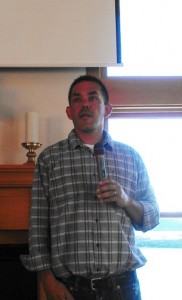
Chief Bill James of the Lummi Nation speaks at Emmanuel Episcopal Parish Hall on Saturday, August 31.
By Margie Doyle
Lummi Nation leaders Bill James and Jay Julius, and Director of the Native American Land Conservancy Kurt Russo came to Orcas Island to note their ancestors’ stories of life on Orcas Island, the history of United States’ 1854 Treaty recognizing the rights of Native Tribes to fish (upheld in 1974 by the “Boldt Decision”), and the history of trespass on ancestral burial grounds and tree graves. They also spoke of the threat the proposed Gateway Pacific Coal Terminal at Cherry Point, near Ferndale presents, and their efforts to publicize their opposition to the project.
Michael Riordan (Orcas scientist and writer who has published several opinions about the proposed coal terminal at Cherry Point:
- lummi-leaders-to-discuss-opposition-to-coal-terminal
- what-the-corps-of-engineers-scoping-decision-means-to-nw-coal-terminals
- risky-coal-market-jeopardizes-terminal-plans),
introduced the Lummi and Native American visitors at Emmanuel Episcopal Parish Hall last Saturday. He spoke of the the effect of the Gateway Coal Terminal on the environment and economy — his areas of his expertise — and acknowledged the “different dimensions — cultural and spiritual” which the Lummi Nation brings to the Cherry Point coal terminal.
Following a blessing by the Lummi visitors — who stressed repeatedly in the meeting that Orcas was their home — Bill James, Chief of the Lummi Tribe and Nation, spoke first in the Native American tongue and then in English.
He spoke “of all the things our people have been through for generations of time… smallpox, flu, Christianity, boarding schools and assimilation…. People think we’re angry — we carry a deep hurt for what happened to our ancestors.
“We’re still here no matter what happens, trying to protect our life for future generations.”
James talked of the Native American respect for their ancestors and for the earth and seas, and of their concern for the generations to come. “We practice what your Christianity is teaching every day. We have to deal with those who come after us.”
Lummi Nation Secretary Jay Julius, said, “It’s hard to be here; to communicate … why Lummi Nation is at Ground Zero and why it’s important. As an elected leader it’s my duty to protect future generations.”
Julius is a commercial fisherman, and he spoke of the Native American invention of the reef net, of the Treaty guaranteeing tribal fishing and hunting rights, the takeover of fishing sites in the 1890’s, deformities now appearing in fish harvests, and the Washington State “Boldt Decision.”
With regard to the Cherry Point Coal Terminal expansion, Julius said, “It’s called progress, taxes, jobs.” He debated the claim that 243 jobs would be created, saying it fails to take into account the jobs in traditional fishing-related activities, tribal sovereignty and traditional lifestyle that would be lost. Those are the reasons that the Lummi Nation is not in support of the Coal Terminal and expressed their opposition in their letter to the Army Corps of Engineers, Julius said.
He called for all to “stand up as citizens… to get the word out. [The Cherry Point Coal Terminal] is not about jobs and tax dollars.”
The Lummi leaders also spoke of the Totem Pole Journey to take place along the route that coal trains will take from Wyoming to Cherry Point. Jewell James, Director of the Lummi Nation’s Sovereignty and Treaty Protection Office, has carved totem poles that are installed at 9-11 memorial sites in New York City, Shanksville, Penn., and the Pentagon and at the National Cemetery in Washington D.C. James’ latest totem pole is now being finished, and the coal train journey is scheduled to begin in two weeks.
People are asked to contribute to the Totem Pole Journey and its efforts to bring national attention to the opposition to coal shipping from Wyoming to the Salish Sea and thence to China.
Past San Juan County Council Member Lovel Pratt presented Julius with 16 pages of signatures gathered at the San Juan County Fair, thanking the Lummi Nation for its leadership and stewardship. Pratt also presented a copy of the letter from the Lummi Nation to the US Army Corps of Engineers opposing the proposed Gateway Pacific coal terminal.
Friends of the San Juans Executive Director Stephanie Buffum thanked the Lummi leaders for their “moving and powerful” presentations.
Orcas County Council Member Rick Hughes mentioned his own ancestors, who are buried on Orcas Island, in support of the Lummi Nation’s efforts. He announced that the County plans a health survey to demonstrate the negative effects of coal trains, terminals and shipping. Hughes also asked for “a meeting of friendship in the future” with Lummi Leaders and was assured that they too sought such a meeting.
Barbara Keller asked supporters to write Washington’s Senator Maria Cantwell, who is Chair of the Senate Committee for Indian Affairs. “We are your friends and allies. Welcome home,” she said to the Lummi Nation leaders
Comments from the audience brought out strong feelings about aiding the Chinese economy at a cost to the American and Native American nations. Chom Graecen of Lopez Island spoke movingly of her own Chinese ancestry, saying “You can’t divide ‘us’ and ‘them.’ We from China don’t want [coal imports] either. We’re working to steer away from dirty fuel. We’re all in this together.”
In conclusion Michael Riordan referred to the Treaty of Medicine Creek that guarantees tribal fishing rights “in usual and accustomed places.”
Chief Bill James urged the audience to speak out as he is doing: “It’s taking a lot to stand up but [because of] the importance of the work, I have to do it.”
“It’s going to take lots of people.”
**If you are reading theOrcasonian for free, thank your fellow islanders. If you would like to support theOrcasonian CLICK HERE to set your modestly-priced, voluntary subscription. Otherwise, no worries; we’re happy to share with you.**









Margie, you have written an excellent summary of the event, as always. Thank you so much. And please, everyone, write Senator Cantwell. We have a chance to stop what would amount to possibly disastrous consequences for all the locals, Native Americans included. To email her, go to https://www.cantwell.senate.gov/public/index.cfm/email-maria.
Yes, thank you, Margie, for your excellent coverage of this moving occasion, which exceeded my hopes. And yes, please write Senator Cantwell, if only a few sentences, in support of the Lummi stand.
Deep appreciation to the Lummi who shared their challenges and vision with us. I stand with you and want to see the Salish Sea restored to health, with your wellbeing, and all of us benefitting from carrying enough now to protect what is sacred for many generations’ lives and livelihood.